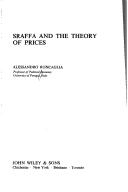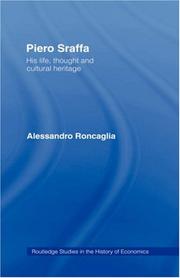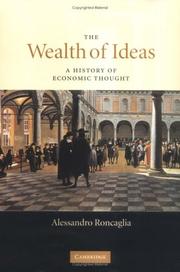| Listing 1 - 10 of 27 | << page >> |
Sort by
|
Book
ISBN: 0873323157 Year: 1985 Publisher: Armonk, N.Y. M.E. Sharpe, Inc.
Abstract | Keywords | Export | Availability | Bookmark
 Loading...
Loading...Choose an application
- Reference Manager
- EndNote
- RefWorks (Direct export to RefWorks)
Economic schools --- Petty, W. --- 330.81 --- Classical school of economics --- -Economics --- -Economic theory --- Political economy --- Social sciences --- Economic man --- Classical economics --- Individualist school of economics --- Orthodox school of economics --- Schools of economics --- Voorlopers van Adam Smith. Mercantilisme. Colbertisme. Fysiocraten. Kameralisme --(economisch denken) --- History --- Petty, William Sir --- -Voorlopers van Adam Smith. Mercantilisme. Colbertisme. Fysiocraten. Kameralisme --(economisch denken) --- 330.81 Voorlopers van Adam Smith. Mercantilisme. Colbertisme. Fysiocraten. Kameralisme --(economisch denken) --- Economics --- Petty, William, --- Petty, William

ISBN: 047199538X 9780471995388 Year: 1979 Publisher: Chichester: Wiley,
Abstract | Keywords | Export | Availability | Bookmark
 Loading...
Loading...Choose an application
- Reference Manager
- EndNote
- RefWorks (Direct export to RefWorks)
Prices --- Sraffa, Piero --- Prices. --- Sraffa, Piero. --- AA / International- internationaal --- 380.20 --- 380.1 --- 338.5 --- Commercial products --- Commodity prices --- Justum pretium --- Price theory --- Consumption (Economics) --- Cost --- Costs, Industrial --- Money --- Cost and standard of living --- Supply and demand --- Value --- Wages --- Willingness to pay --- Prijstheorieën: algemeenheden. --- Waardeleer. --- Prijsvorming. Prijskostenverhouding. Prijsbeweging. Prijsfluctuatie--macroeconomisch; prijsindex zie {336.748.12} --- 338.5 Prijsvorming. Prijskostenverhouding. Prijsbeweging. Prijsfluctuatie--macroeconomisch; prijsindex zie {336.748.12} --- Waardeleer --- Prijstheorieën: algemeenheden --- Sraffa, Piero. - Production of commodities by means of commodities.

ISBN: 0415234808 1138010081 9786610402045 0203184327 1280402040 020319036X 0429229364 113456578X 9780203190364 9780415234801 Year: 2000 Volume: 38 Publisher: London: Routledge,
Abstract | Keywords | Export | Availability | Bookmark
 Loading...
Loading...Choose an application
- Reference Manager
- EndNote
- RefWorks (Direct export to RefWorks)
This is a lively, intellectual biography of a leading protagonist of 20th century culture and his relations with other protagonists, such as Gramsci, Keynes and Wittgenstein. The book includes an authoritative interpretation of his main work Production of Commodities by Means of Commodities, a survey of the debates which followed its publication, and hence of the subsequent research strategies undertaken by different 'Sraffian schools'
Economic schools --- Sraffa, Piero --- Economists --- Economics --- History --- Sraffa, Piero. --- Sraffa, P. --- Economists - Italy - Biography --- Economics - History - 20th century

ISBN: 9780521843379 9780521691871 9780511492341 0521691877 0511121962 9780511121968 0511112971 9780511112973 051111348X 9780511113482 9780511349522 0511349521 0511492340 0521843375 1107140633 1107713803 0511347634 9786611085599 0511350406 1281085596 1280150165 0511198248 0511324022 Year: 2009 Publisher: Cambridge: Cambridge university press,
Abstract | Keywords | Export | Availability | Bookmark
 Loading...
Loading...Choose an application
- Reference Manager
- EndNote
- RefWorks (Direct export to RefWorks)
The Wealth of Ideas, first published in 2005, traces the history of economic thought, from its prehistory (the Bible, Classical antiquity) to the present day. In this eloquently written, scientifically rigorous and well documented book, chapters on William Petty, Adam Smith, David Ricardo, Karl Marx, William Stanley Jevons, Carl Menger, Léon Walras, Alfred Marshall, John Maynard Keynes, Joseph Schumpeter and Piero Sraffa alternate with chapters on other important figures and on debates of the period. Economic thought is seen as developing between two opposite poles: a subjective one, based on the ideas of scarcity and utility, and an objective one based on the notions of physical costs and surplus. Professor Roncaglia focuses on the different views of the economy and society and on their evolution over time and critically evaluates the foundations of the scarcity-utility approach in comparison with the Classical/Keynesian approach.
Economics --- History --- History of civilization --- Economic schools --- History. --- 330.1 --- 330.40 --- AA / International- internationaal --- Geschiedenis van het economisch en sociaal denken --- Histoire économique. --- Économie politique --- Histoire. --- Business, Economy and Management --- Economics - History --- Histoire économique. --- Économie politique
Book
ISBN: 9781108478441 9781108745819 9781108777766 Year: 2019 Publisher: Cambridge Cambridge University Press
Abstract | Keywords | Export | Availability | Bookmark
 Loading...
Loading...Choose an application
- Reference Manager
- EndNote
- RefWorks (Direct export to RefWorks)
330.40 --- Geschiedenis van het economisch en sociaal denken --- Economic schools
Book
ISBN: 1316814556 1316798410 1316811824 110717533X 1316627365 9781316627365 9781107175334 9781316798416 Year: 2017 Publisher: Cambridge: Cambridge university press,
Abstract | Keywords | Export | Availability | Bookmark
 Loading...
Loading...Choose an application
- Reference Manager
- EndNote
- RefWorks (Direct export to RefWorks)
"A Brief History of Economic Thought The evolution of economic thought can be traced back from its beginnings in classical antiquity up to the present day. In this book, Professor Alessandro Roncaglia offers a clear, concise and updated version of his award- winning The Wealth of Ideas, studying the development of economic thought through perspectives and debates on the economy and society over time. With chapters on prominent economic theorists, including William Petty, Karl Marx, and John Maynard Keynes, as well as on other important figures and key debates of each period, Roncaglia critically evaluates the foundations of the marginalist-neoclassical (scarcity-utility) approach in comparison to the Classical-Keynes approach. A comprehensive guide to the history of economic thought, this book will be of value not only to undergraduate and postgraduate students studying economic thought, but also to any readers desiring to study how economics has evolved up to the present day"-- "The evolution of economic thought can be traced back from its beginnings in classical antiquity up to the present day. In this book, Professor Alessandro Roncaglia offers a clear, concise and updated version of his award-winning The Wealth of Ideas, studying the development of economic thought through perspectives and debates on the economy and society over time. With chapters on prominent economic theorists, including William Petty, Karl Marx, and John Maynard Keynes, as well as on other important figures and key debates of each period, Roncaglia critically evaluates the foundations of the marginalist-neoclassical (scarcity-utility) approach in comparison to the Classical-Keynes approach. A comprehensive guide to the history of economic thought, this book will be of value not only to undergraduate and postgraduate students studying economic thought, but also to any readers desiring to study how economics has evolved up to the present day"--
Economics --- History. --- Economics - History --- Economic schools
Book
ISBN: 1108777767 110878660X 1108802958 1108478441 1108745814 Year: 2019 Publisher: Cambridge, England : Cambridge University Press,
Abstract | Keywords | Export | Availability | Bookmark
 Loading...
Loading...Choose an application
- Reference Manager
- EndNote
- RefWorks (Direct export to RefWorks)
The field of economics has proliferated in complexity and importance since the Second World War. Alessandro Roncaglia recounts the history of the different approaches (marginalist, neoclassical, Keynesian, Austrian, monetarism, rational expectations, institutionalist, evolutionary, classical-Sraffian) and the different fields (micro, macro, money and finance, industrial and game theory, institutions, public finance, econometrics), illustrating the thought and personality of the most important contemporary economists (from Hayek to Sraffa, from Modigliani and Samuelson to Friedman, from Simon to Sen, and many others), focusing on the conceptual foundations of the different streams. At the same time he appraises critically the important debates and controversies in the field and concludes by discussing possible future directions for economic thought. This follow-up to The Wealth of Ideas: A History of Economic Thought is a readable introduction to the contemporary economics discourse, accessible to economics students and informed general readers, and an important complement for advanced students and economists active in specialized fields.
Book
ISBN: 9788898291830 8898291833 Year: 2021 Publisher: Zermeghedo: Saecula,
Abstract | Keywords | Export | Availability | Bookmark
 Loading...
Loading...Choose an application
- Reference Manager
- EndNote
- RefWorks (Direct export to RefWorks)
Book
ISBN: 9781403987464 1403987467 Year: 2009 Publisher: New York: Palgrave MacMillan,
Abstract | Keywords | Export | Availability | Bookmark
 Loading...
Loading...Choose an application
- Reference Manager
- EndNote
- RefWorks (Direct export to RefWorks)
Sraffa, Piero --- Economists - Italy - Biography --- Economics - History - 20th century --- Economists --- Economics
Book
ISBN: 9781138010086 Year: 2014 Publisher: London : Routledge,
Abstract | Keywords | Export | Availability | Bookmark
 Loading...
Loading...Choose an application
- Reference Manager
- EndNote
- RefWorks (Direct export to RefWorks)
| Listing 1 - 10 of 27 | << page >> |
Sort by
|

 Search
Search Feedback
Feedback About UniCat
About UniCat  Help
Help News
News